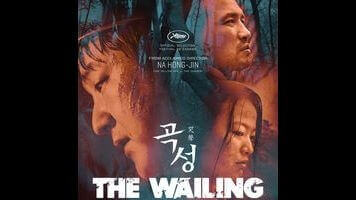
Pure evil proves an elusive matter for a provincial policeman to investigate in the Korean film The Wailing, a supernatural thriller that veers between caustic comedy and blood-soaked horror over the course of its operatically intense two and a half hours. It’s anyone’s guess why the film’s otherwise peaceable rural-village setting has lately seen a rash of grisly murders. Yet perhaps the most mysterious thing about The Wailing, which just last month opened to huge numbers at the Korean box office before going on to play out of competition at Cannes, has to do with the spell it casts rather than with the mechanics of its plot. The Wailing might be a somewhat meandering and nonsensical genre recombination, but that spell never breaks over its lengthy running time.
In part that’s owing to the evocation of Goksong, the mountainous and rainy locality where the action unfolds—and a place-name that doubles as the film’s original title. It took six months for writer-director Na Hong-jin (The Chaser) to shoot the movie, and the apparently painstaking approach of Na and cinematographer Hong Kyung-pyo (a collaborator of Bong Joon-ho’s) has resulted in a story that truly feels saturated with a sense of spiritual foreboding. The landscape itself, shown in all its dense greenery during both rain showers and magic-hour clearings, seems to be hiding something, even during the film’s ostensibly lighter moments.
Na front-loads most of the out-and-out humor here, as his police officer protagonist, Jong-gu (Kwak Do-won, who also played a supporting part in Na’s second feature, 2010’s The Yellow Sea), appears perilously out of his depth visiting a number of crime scenes. His general day-to-day bumbling—for one thing, he’s so careless that his daughter, Hyo-jin (Kim Hwan-hee), doesn’t have to go very far out of her way to witness his extramarital affair—gradually gets replaced by a dawning terror, as he’s plagued by increasingly gruesome sights both on the job and in his dreams.
Comic presentations of law enforcement as corrupt and inefficient seem a particular staple of Korean procedurals (or at least the ones that get exported stateside), so it’s somewhat of a relief to see The Wailing move into more unpredictable territory in fairly short order. The movie begins asking a number of teasing questions, none of which it’s in a particular hurry to answer. Who is the Japanese loner (Jun Kunimura)—dismissively referred to by the suspicious, rumormongering villagers as “the Jap”—who has recently set up camp in the surrounding woods? Is he connected to the zombielike sickness of the mind, heralded by rashes and boils on the skin, that seems to be driving Goksong’s inhabitants to kill? And is he somehow in league with the red-eyed human form that many report to have spied crawling on all fours and gnawing raw flesh?
Jong-gu may be introduced as an absentminded family man, but, naturally, it comes to pass that he must defend his own home from the malevolent spirits wreaking havoc on the town—whoever or whatever they may be. When young Hyo-jin shows signs of possession—a suddenly foul mouth and blistering skin chief among them—her father enlists the services of a shaman (Hwang Jung-min), who drives his brand-new SUV, packed with his ancient bag of tricks, all the way south from Seoul. At this point, Na builds suspense through muscular cross-cutting: In one particularly memorable sequence, he moves back and forth between elaborate, deafening death-hex rituals performed by both the showman shaman and Kunimura’s menacingly pallid stranger.
The filmmaker thus establishes a good-and-evil binary that he only complicates as Jong-gu and his associates gather more evidence down the film’s home stretch. Perhaps The Wailing is so strangely haunting because Na, by continually failing to settle on a single otherworldly source of all the carnage, winds up uncovering wickedness in worldlier places altogether. After all, as the villagers learn the hard way, conducting a witch hunt is an irreversible evil in itself.